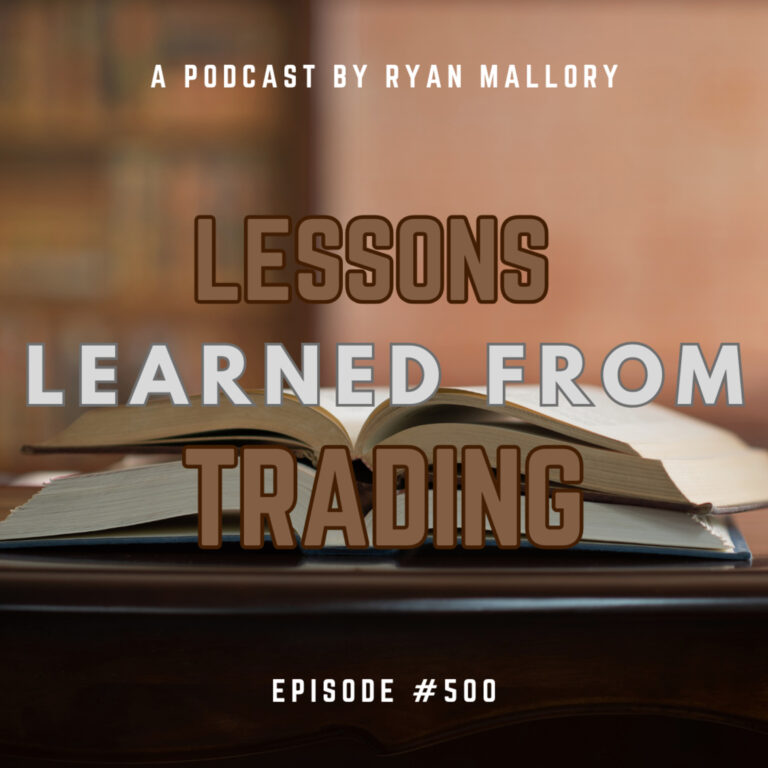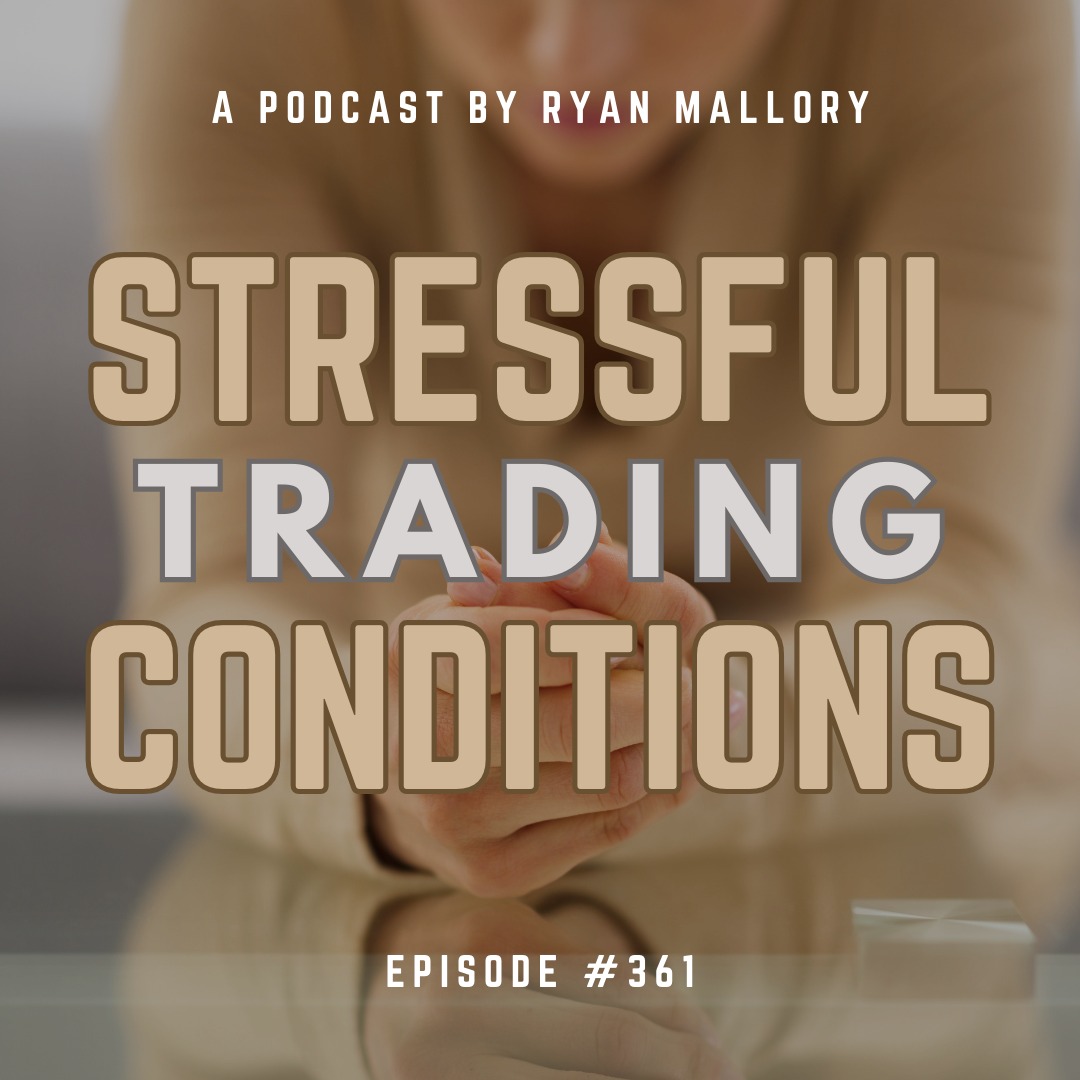Episode Overview
Let’s face it, there are times in life where it is simply bad to be swing trading. A loved one dies, you’re going through divorce, or the financials just don’t support it – either way it is important to recognize this, and when to wait for better seasons of trading, because the stress will impact your trading decisions, and that is not a good thing!
Available on: Apple Podcasts | Spotify | Amazon | YouTube
Episode Highlights & Timestamps
- [0:07] Introduction:
Ryan kicks off the episode with his podcast intro and previews the dual focus on covered calls and personal hardship. - [1:19] Listener Letter: “B Money”:
A returning listener shares his emotional story of divorce, single parenthood, and overcoming financial struggles while staying committed to investing. - [4:41] Trading Through Personal Hardships:
Ryan reflects on his own experience trading during a divorce and the emotional toll it can take. He discusses how grief and stress can impact trading decisions. - [10:27] When to Step Back from Trading:
Advice for single parents or anyone dealing with intense stress. Ryan explains why sometimes the best trade is no trade at all. - [12:52] Using Covered Calls for Long-Term Income:
Ryan explains how he uses covered calls in his dividend portfolio to enhance returns and shares key considerations before using the strategy.
Key Takeaways from This Episode:
- Trading During Hardships: Emotional stress like divorce or the death of a loved one can impair judgment. It’s often best to step away from active trading during those times.
- Support Matters: Having a supportive spouse or partner can significantly affect your trading success and mental clarity.
- Covered Calls as Strategy: Covered calls are useful for generating additional income in long-term or dividend portfolios, especially in flat or down-trending markets.
- Use Caution With Options: Covered calls can lead to assignment. Be prepared to part with shares if the strike price is hit.
- Adapt to Life’s Seasons: During financially tight seasons, consider scaling back trading or paper trading to refine your skills until you’re better positioned.
Resources & Links Mentioned:
- Swing Trading the Stock Market – Daily market analysis, trade setups, and insights by Ryan Mallory.
- Join the SharePlanner Trading Block – Get real-time trade alerts and community support.

Take the Next Step:
✅ Stay Connected: Subscribe to Ryan’s newsletter to get free access to Ryan’s Swing Trading Resource Library, along with receiving actionable swing trading strategies and risk management tips delivered straight to your inbox.
📈 Level Up Your Trading: Ready for structured training? Enroll in Ryan’s Swing Trading Mastery Course, The Self-Made Trader, and get the complete trading course, from the foundational elements of trading to advanced setups and profitable strategies.
📲 Join the Trading Community: Sign up for SharePlanner’s Trading Block to become part of Ryan’s swing-trading community, which includes all of Ryan’s real-time swing trades and live market analysis.
Full Episode Transcript
Click here to read the full transcript
0:07
Hey, I’m Ryan Mallory and this is my Swing Trading the Stock Market podcast. I’m here to teach you how to trade in a complex, everchanging world of finance. Learn what it means to trade profitably and consistently managing risk, avoiding the pitfalls of trading, and most importantly, to let those winners run wild.
0:25
You can succeed at the stock market, and I’m ready to show you how. Hey everybody, this is Ryan Mallory with Swing Trading the Stock Market in today’s podcast episode is going to be about covered calls and also a little bit about personal hardships.
0:41
Trading during personal hardships. I think that’s an important topic to address as well. The guy who’s emailing this show, he’s a repeat emailer. And I always like this. I always tell people, don’t just stop at one e-mail. If you have a good question, that there’s no reason why I can’t make a second podcast episode out of your question.
0:58
So yeah, if you’re out there, you’re listening. It’s like, man, I wish I would have asked him this the first time when I wrote the show. Send me another one. I like him. So this guy, we’re calling him B Money, just like last time. Last time he asked me about what does it mean when you’re short in the stock market. This time a little bit more about covered calls and some personal matters that will discuss and not so personal of a manner because it’s on the podcast.
1:19
So he writes. Hey Brian, great podcast. Isn’t my second e-mail to you actually use my e-mail regarding what is shorting the stock market really made? And I gave you my name, be money. Anyways, you say how you like to hear our stories and I listened to your August 14th podcast or sometime around there and I realized our stories are very similar.
1:38
I’m 47. I lost both of my parents in my 30s. I lost my oldest brother just two years ago. I got divorced at 37, like, totally blindsided. I was a single dad of three kids just trying to survive. I had to move to a different city because my ex took the kids there.
1:55
We have 5050 custody. It was rough. I was left with $60,000 of debt, with no family to help me. Plus I was alone in a new city where I didn’t even know anyone, not to mention the financial albatross around my neck. What I learned from all of this is that everything happens for a reason and to trust God.
2:15
Maybe you could give advice to single parents trying to pay all of their bills while still trying to invest. I know I have had to pay about $1700 a month and child support. Good grief. So I know it’s not easy. Well, Fast forward 10 years and now I’m with an amazing woman who has done wonders for me and my kids.
2:35
We are all doing well and I am thankful for the many blessings in our lives. So that’s basically my story. Glad you shared that story with us. Really good. And believe it or not, a lot of times when you share your stories about trading, investing and just how it intertwines with your personal life, there’s a lot of tidbits to pick up in there.
2:51
I know this is a swing training podcast, which I personally don’t do. What I’m more of a buy and hold investor however, you’re less than setting stop losses have been beneficial and one of the most important ones anyone could take from you. I love your line of manage the risk and the profits will take care of themselves.
3:09
What are your thoughts on selling cover calls? I sell cover calls but not near a dividend X date. In Canada we can sell puts unless you have $100,000 in a margin account. So I don’t do that or spreads, just sell covered calls for the premium or at a price that if I get assigned, I don’t mind taking the premium and the profit at the strike price.
3:28
I would love to hear your comments on this. God bless be money. First of all, I didn’t know that in candidate you had to have $100,000 in a margin account. That’s new to me. See what I mean? When you guys write, I learn stuff from you guys all the time. I’ve learned stuff about the Australian markets, the Canadian markets, all sorts of good stuff.
3:45
Sometimes I have to do some research on these podcast episodes too because we’re dealing with matters that I might not know all that much about. So first of all, the personal story, the personal background stuff. I will tell you this. I’ve been married twice, divorced once, and very, very happily married.
4:02
Right now I’m married to the most wonderful woman in the world. I honestly couldn’t do a day without her. I really couldn’t. She just makes every day of my life just absolutely wonderful. And I’m not trying to act like that. Life is perfect or everything goes exactly the way I expect it to.
4:21
It doesn’t. Didn’t do it today, but at the end of the day I have a wonderful woman in my life and I golly, I couldn’t, I couldn’t possibly be more thankful than that than I have for anything else in my life. So with that, divorce is very difficult and I would say trading during a divorce is very difficult.
4:41
I traded during a divorce and it wasn’t easy. I remember being at court and I’m trying to decide whether or not to close out a certain stock or not. You know, I had, I had an X on the stand talking about me. Talking about me in ways that I did not much appreciate and I’m trying to figure out whether or not I should be closing out Spy or letting it ride or whether or not I should be getting into another stock or staying in cash.
5:07
And and it’s it’s stressful. Divorce is brutal. I remember death. You know, losing a brother, I wasn’t necessarily actively trading at that time. I was 19 and I had, it was during the time of my life or things were pretty quiet from a trading standpoint.
5:24
But four years ago when mother passed away, you know, and I took about a week, week and a half off from trading. But I can tell you you got to step back at times and if you don’t do it, you’re only putting yourself at risk. One of the main reasons for it is because sometimes you gain a little bit too much perspective.
5:40
And the reason why I say that is you know when things are going normal, when things are going routine, winning and losing in the stock market probably takes on a little bit more of a high end importance. You know you’re, you’re focused on the risk, you’re making sure that you’re managing the trade, you’re taking profits at where you should.
5:56
When somebody dies in the family. All of a sudden, that kind of stuff, managing the risk swing, trading, trying to be profitable in the stock market seems a little bit less important. And by a little less important, I probably mean a lot less important. And it’s easy when you’re going through those times, when you’re mourning and when it’s difficult from a trading perspective to where all of a sudden you’re going to be like, you know what?
6:18
I just really don’t care what it does. I don’t care what the stock does. Let it go to zero. I could care less. I miss my mom. I miss my dad. And you know, if, God forbid, if it’s a kid, you don’t want to see that either. I watched my parents. They lost a son. My brother, when I was 19, he was 25, was very unexpected, died of testicular cancer three weeks after he was diagnosed with it.
6:39
And I can tell you, I mean it by the grace of God, they came out of it pretty well. You know, I mean, they were sad. They’ve said that they lost them, but it was devastating. And I tell you, if my dad was a swing trader at that time, he could have probably cared less what happens to his trades.
6:57
You could have had him Yolo in the AM C with, you know, calls expiring tomorrow and it’s needs 100% just to reach the strike. And he wouldn’t have cared. Because when you’re going through those difficult times, the importance of money, the importance of what your trades do matter a lot less than they do during normal, routine times of life where you don’t have those kinds of just heartbreaking stress.
7:24
And so just like with death, same thing with divorce. I mean, divorce is kind of like a living death where you’re just, you’re going through something that’s very agonizing, very difficult. It just feels like you’re being beaten on daily and it’s not good, especially when it’s very contentious.
7:42
Divorce, I’m always amazed when people have divorces and there’s not distress involved. Everybody just seems like they go away being friends. I’ve heard about it, I’ve know people that have had that, but it always blows my mind that people could actually say that they’re able to do that.
7:58
I feel like divorce is such an awful thing that the stress and trying to trade stocks at the same time just really does not work very well.
8:14
Because when you’re a single parent, you have the responsibilities, at least when you have him in your care. And in my case, I have my son, 50% of the time, you have a lot more responsibility on your plate.
8:33
And so in this person’s case, he pays $1700 a month of child support. That’s a lot of money. That’s a lot of stress. I mean, that’s more than a lot of people’s mortgage payments. And so that can be a lot more additional stress.
8:48
But you have a good spouse, a lot of spousal support there that can make or break a traitor. I mean, my wife, most supportive person in the world when it comes to my trading. And I appreciate that because I came from his instance where that was not always the case.
9:07
And that was very difficult. And I’m not here to try to, you know, say who was right or wrong at a previous marriage or anything. But just from my perspective, things were very difficult for trading and it created a lot of stress at times.
9:29
So the difference is, is somebody that supports you, you have confidence in what you’re doing. And right now I, I tell you the market has not been all that easy to me this week. I didn’t feel like it was that easy last week. You know, you have a lot of moves in the market where you’re ramping up higher in the morning time only to fade in the afternoon or vice versa.
9:46
And it’s very hard to get direction. It’s very hard to navigate a very choppy market, especially one that sends a lot of false signals. I mean, good grief. I was in Netflix today, guys. I got into like 435. I was playing this bounce off of support. It looked like it was holding support. It was doing setting up pretty well. It started moving up to like four 36437.
10:09
OK, this is going to be a good bounce play. I kid you not. By the time I went to the bathroom and came back, the trade was stopped out. Fortunately, there’s a good lesson to use in stop losses there guys. I guess the CFO came out and said something about the revenue that it wasn’t going to be as strong in 2024 or about the ad revenue being, you know, further down the road than expected.
10:27
I don’t even know what the exact news piece was, but it killed my trade. I mean, like within an instant. And if you’re going through hard times, that kind of a trade, if you have a spouse that’s not supportive of what you’re doing, or if you are going through a divorce or you’re going through a death, that stuff can really drive you to pure madness.
10:43
So the take away here is if you’re going through difficult times, that’s not always the best time to be, you know, trying to swing big for the fences or trying to to make it big as a swing trader or a day trader or anything else. Longterm investing that tends to be more passive.
11:00
You’re not having to check it each day, but from a swing trading standpoint, it’s important not to add additional stresses to your life when you’re already stressed out to the Max and as a single parent, a lot of times you’re strapped for cash you don’t have a lot because like in the case of B money, he’s paying $1700 for child support.
11:25
In some cases you’re paying out all the money on top of that. So if you’re still trying to live in your apartment or your house or or whatever it is, where in the world are you getting the money for additional investing? And that’s a challenge And perhaps during this season of life and and there’s always different seasons of life when you’re going through the different seasons, you may just have to say to yourself, I really can’t trade in a way that’s going to allow me to make a huge difference financially in my life.
11:42
I just not. I’m strapped for cash. I’m paying child support. I’m paying alimony, Had a wife die or a husband die. And it’s left me financially, you know, depleted. It’s actually shocking how much it costs to bury a loved one these days.
12:01
Maybe it’s only like a few $100 and you’re doing fractional shares so that you’re learning so that you’re hunting in the skills, so that when you do come across a time in life where you do have more money, you can actually apply more capital. Now let me tell you, if you’re strapped for cash, don’t do this.
12:20
But if you’re not strapped for cash, check out swingtradingthestockmarket.com. This is going to give you all my stock market research each and every day. That’s going to include my weekly bullish and bearish watch lists, my daily watch lists of setups that I’m looking at possibly trading each day. Plus you’re going to get updates throughout the week on big tech stocks.
12:36
You’re also going to be getting updates on the market overall, some really, really good stuff. So check that out between trade and the-stockmarket.com. Now what about covered calls? I mean that was kind of what this podcast was about and I kind of went down, you know, the dark and gloomy Rd. but I think that was important to do that.
12:52
So I do use covered calls. I think they’re pretty good from a long term standpoint. If you have a stock that might not have a lot of volatility or maybe it’s in that pattern of a downturn, but you still plan on holding it for the long term, you can sell calls against that.
13:11
As long as it doesn’t go above the strike price, you’re getting the full premium from it, then they get assigned your shares. But the key is and again I’m not an options expert by any means, I don’t call myself one. I know how to do covered calls. I know how to do a lot of other types of options.
13:28
The only ones that I really do is covered calls. And so I’ll use them in my dividend portfolio. I’ll use them in my long term accounts and they are helpful. The challenge is often times finding a premium that is not likely to get assigned. That can be a rather difficult thing.
13:44
Sometimes you might only get a few bucks off of a call contract by selling it. But when you’re using it in your dividend account, it’s actually a nice little enhancer to your current dividends that you’re already getting for the stocks. So let’s say you’re in a stock and it has like a six or 7% dividend, but you can sell weekly contracts or you can sell monthly contracts.
14:02
That’s practically like getting another dividend. And so as long as it doesn’t get assigned, you’re making money off of that on a weekly or a monthly basis. However, you’re trading it. And if you do end up losing the shares, they get assigned to somebody else who bought the calls. Well, guess what, You still made money on the overall trade.
14:23
I’m assuming that the premium was above where your entry price was, that you still made money, and you got to be okay with losing the shares. Potentially for a game that you know might not have been as great as you were expecting, that’s possible. But if you’re able to continuously sell calls against the position over time, that makes a huge difference in the return on your shares, especially if you’re getting a decent dividend from it as well.
14:39
It’s like an enhanced dividend. So yes, the answer and I and I didn’t really get too much into the cover calls simply because I’m not as confident probably with diving into a lot of the terminology that surrounds options trading because I don’t spend a lot of time studying and researching it.
14:56
I tend to focus more just on price and volume, on swing trades and buying the equities outright. But when it comes to do it, my dividend portfolio or my longterm account, I do sell cover calls against it. It’s definitely something that’s worth checking out, something that you want to become very familiar with before you do it, just so that there’s no surprises along the way.
15:12
But yeah, I think it’s a great idea, great, great strategy for trading. So if you enjoy this podcast episode, I would encourage you to leave me a 5 star review on whatever platform you’re listening to. If it’s Amazon or Apple or Spotify, I like Spotify a lot. Leave me a good review.
15:29
I appreciate that, man. Also make sure that you check out swingtradingthestockmarket.com. Really good stuff there. Plus send me your questions. Tell me your stories. I wanna hear about it. You can get into the nitty gritty man. I want to hear about what is going on in your life, how it pertains to trading and I want to make an episode out of it.
15:45
So send that to me ryan@shareplanner.com. Thank you guys and God bless. Thanks for listening to my podcast Swing Trading the Stock Market. I’d like to encourage you to join me in the SharePlanner trading block where I navigate the stock market each day with traders from around the world.
16:01
With your membership, you will get a seven day trial and access to my trading room including alerts via text, e-mail and WhatsApp. So go ahead, sign up by going to shareplanner.com/trading Block that’s www.shareplanner.com/trading-block and follow me on SharePlanners, Twitter, Instagram and Facebook where I provide unique market and trading information every day.
16:22
If you have any questions, please feel free to e-mail me at ryan@shareplanner.com. All the best to you and I look forward to trading with you soon.
Enjoy this episode? Please leave a 5-star review and share your feedback! It helps others find the podcast and enables Ryan to produce more content that benefits the trading community.
Have a question or story to share? Email Ryan and your experience could be featured in an upcoming episode!
Become part of the Trading Block and get my trades, and learn how I manage them for consistent profits. With your subscription you will get my real-time trade setups via Discord and email, as well as become part of an incredibly helpful and knowledgeable community of traders to grow and learn with. If you’re not sure it is for you, don’t worry, because you get a Free 7-Day Trial. So Sign Up Today!

Welcome to Swing Trading the Stock Market Podcast!
I want you to become a better trader, and you know what? You absolutely can!
Commit these three rules to memory and to your trading:
#1: Manage the RISK ALWAYS!
#2: Keep the Losses Small
#3: Do #1 & #2 and the profits will take care of themselves.
That’s right, successful swing-trading is about managing the risk, and with Swing Trading the Stock Market podcast, I encourage you to email me (ryan@shareplanner.com) your questions, and there’s a good chance I’ll make a future podcast out of your stock market related question.
In today's episode, at episode 500, I am diving into the lessons learned from trading over the last 100 episodes, because as traders we are evolving and always attempting to improve our skillset. So here is to episode 500, and to another 500 episodes of learning and developing as swing traders in the stock market!
Be sure to check out my Swing-Trading offering through SharePlanner that goes hand-in-hand with my podcast, offering all of the research, charts and technical analysis on the stock market and individual stocks, not to mention my personal watch-lists, reviews and regular updates on the most popular stocks, including the all-important big tech stocks. Check it out now at: https://www.shareplanner.com/premium-plans
📈 START SWING-TRADING WITH ME! 📈
Click here to subscribe: https://shareplanner.com/tradingblock
— — — — — — — — —
💻 STOCK MARKET TRAINING COURSES 💻
Click here for all of my training courses: https://www.shareplanner.com/trading-academy
– The A-Z of the Self-Made Trader –https://www.shareplanner.com/the-a-z-of-the-self-made-trader
– The Winning Watch-List — https://www.shareplanner.com/winning-watchlist
– Patterns to Profits — https://www.shareplanner.com/patterns-to-profits
– Get 1-on-1 Coaching — https://www.shareplanner.com/coaching
— — — — — — — — —
❤️ SUBSCRIBE TO MY YOUTUBE CHANNEL 📺
Click here to subscribe: https://www.youtube.com/shareplanner?sub_confirmation=1
🎧 LISTEN TO MY PODCAST 🎵
Click here to listen to my podcast: https://open.spotify.com/show/5Nn7MhTB9HJSyQ0C6bMKXI
— — — — — — — — —
💰 FREE RESOURCES 💰
— — — — — — — — —
🛠 TOOLS OF THE TRADE 🛠
Software I use (TC2000): https://bit.ly/2HBdnBm
— — — — — — — — —
📱 FOLLOW SHAREPLANNER ON SOCIAL MEDIA 📱
*Disclaimer: Ryan Mallory is not a financial adviser and this podcast is for entertainment purposes only. Consult your financial adviser before making any decisions.





